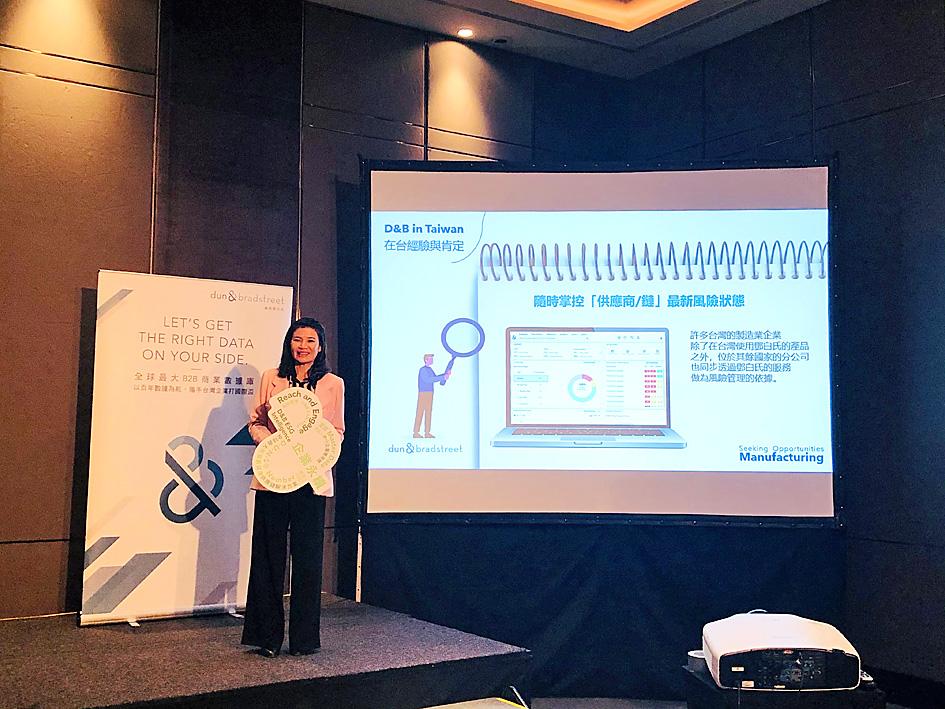Taiwan ranked seventh out of 11 countries and territories in a global sustainability survey, with room for improvement, business data and analytical insights provider Dun & Bradstreet (D&B) said on Thursday.
Taiwan ranked ahead of Australia, Ireland, the US and New Zealand, based on D&B’s competitiveness analysis of supply chains in terms of environmental, social and corporate governance (ESG) performance, the US-based firm said in a statement.
The UK ranked the highest in ESG performance, followed by Germany and France, with Sweden, Canada and Hong Kong ranked fourth, fifth and sixth respectively, it said.

Photo: Kelson Wang, Taipei Times
As global brands such as Apple Inc, Amazon.com Inc and Nike Inc adopt ESG into their corporate strategies — and consider the use of renewable energy, carbon reduction, environmental protection and other issues in their businesses — similar sustainability policies have been extended to the global supply chain.
“ESG has obviously become the entry ticket for small and medium-sized enterprises to the global supply chain, but the evaluations are not standardized in the market,” D&B Taiwan (鄧白氏台灣) general manager Michelle Sun (孫偉真) said in the statement.
“Dun & Bradstreet hopes to reveal data-driven insights that are comprehensive and objective, enabling Taiwan businesses to review and put their ESG goals into practice, while strengthening their competitiveness in the global market,” she said.
The company aims to expand the global coverage of its ESG rankings to more than 100 countries and regions this year, as it seeks to provide a single measurable standard for the global supply chain, it said.
Its ESG competitiveness analysis of Taiwanese supply-chain firms was built on information sourced from its own database, company annual reports and Web sites, D&B said.
MAJOR SUPPLIERS
The survey evaluated 691 suppliers in Taiwan serving six leading manufacturers that made the Fortune Global 500 list: Hon Hai Precision Industry Co (鴻海), Pegatron Corp (和碩), Taiwan Semiconductor Manufacturing Co (台積電), Quanta Computer Inc (廣達), Compal Electronics Inc (仁寶) and Wistron Corp (緯創).
D&B used a computer model to analyze data collected from Feb. 1 last year to Feb. 22 this year, it said.
“In general, 691 Taiwan suppliers performed relatively well in social and governance categories, thanks to the Taiwan government’s long-term interest in these areas,” D&B said. “On the other hand, there still exist challenges to be resolved in the environmental category.”
“Based on observations, emission reduction and management driven by the government is necessary, as Taiwan aims to achieve net zero by 2050,” it added.

In Italy’s storied gold-making hubs, jewelers are reworking their designs to trim gold content as they race to blunt the effect of record prices and appeal to shoppers watching their budgets. Gold prices hit a record high on Thursday, surging near US$5,600 an ounce, more than double a year ago as geopolitical concerns and jitters over trade pushed investors toward the safe-haven asset. The rally is putting undue pressure on small artisans as they face mounting demands from customers, including international brands, to produce cheaper items, from signature pieces to wedding rings, according to interviews with four independent jewelers in Italy’s main

Japanese Prime Minister Sanae Takaichi has talked up the benefits of a weaker yen in a campaign speech, adopting a tone at odds with her finance ministry, which has refused to rule out any options to counter excessive foreign exchange volatility. Takaichi later softened her stance, saying she did not have a preference for the yen’s direction. “People say the weak yen is bad right now, but for export industries, it’s a major opportunity,” Takaichi said on Saturday at a rally for Liberal Democratic Party candidate Daishiro Yamagiwa in Kanagawa Prefecture ahead of a snap election on Sunday. “Whether it’s selling food or

CONCERNS: Tech companies investing in AI businesses that purchase their products have raised questions among investors that they are artificially propping up demand Nvidia Corp chief executive officer Jensen Huang (黃仁勳) on Saturday said that the company would be participating in OpenAI’s latest funding round, describing it as potentially “the largest investment we’ve ever made.” “We will invest a great deal of money,” Huang told reporters while visiting Taipei. “I believe in OpenAI. The work that they do is incredible. They’re one of the most consequential companies of our time.” Huang did not say exactly how much Nvidia might contribute, but described the investment as “huge.” “Let Sam announce how much he’s going to raise — it’s for him to decide,” Huang said, referring to OpenAI

The global server market is expected to grow 12.8 percent annually this year, with artificial intelligence (AI) servers projected to account for 16.5 percent, driven by continued investment in AI infrastructure by major cloud service providers (CSPs), market researcher TrendForce Corp (集邦科技) said yesterday. Global AI server shipments this year are expected to increase 28 percent year-on-year to more than 2.7 million units, driven by sustained demand from CSPs and government sovereign cloud projects, TrendForce analyst Frank Kung (龔明德) told the Taipei Times. Demand for GPU-based AI servers, including Nvidia Corp’s GB and Vera Rubin rack systems, is expected to remain high,